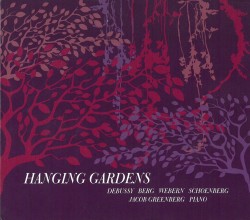 Hanging Gardens – Debussy; Berg; Webern; Schoenberg
Hanging Gardens – Debussy; Berg; Webern; Schoenberg
Jacob Greenberg; Tony Arnold
New Focus Recordings FCR 192 (newfocusrecordings.com)
If one went by the names on the cover of pianist Jacob Greenberg’s two-disc set Hanging Gardens, one might wonder if Debussy were the odd man out. After all, of the four composers featured Debussy was the impressionist, while Schoenberg, Berg and Webern were pioneers of the Second Viennese School, not only tending towards expressionist painting but also favouring an atonal approach to harmonic conception. However, the connection between the four men is deep and born of the desire to look beyond mainstream Western traditions as a way of expanding the vocabulary of music, the vividness of Symbolist poetry and above all an overwhelming sense of the elemental beauty of indeterminate harmonies.
The centerpiece of this repertoire is Schoenberg’s Das Buch der hängenden Gärten, a song cycle based on the poetry of German Symbolist poet Stefan George. The work is a telling illustration of Schoenberg’s search for new modes of expression, which though unified poetically, tend to complete a musical statement within the frame of a miniature, with miniatures succeeding one another without developing a broad narrative pattern. But Greenberg shapes this work, as Schoenberg himself declared writing it: seeking beauty and sacrificing everything to it with the ripples of atonality and dissonance that come with it. Tony Arnold’s agile, luminous soprano voice is ideal and sings with power and subtlety. The Berg Sonata Opus 1 with traces of Liszt and – unsurprisingly – Schoenberg, manipulates tiny fragments of melody and rhythm into a statement dense with dramatic gesture and emotional power. And Webern’s Variations Op.27 are packed with incident and crafted like an overture, which enhances its dramatic potential.
Greenberg appears to be ever the outstanding interpreter of fin de siècle French piano music and his wonderfully lucid and fluent pianism seems perfectly suited to Debussy’s quicksilver imagination. His accounts of both the Études and Préludes are astonishing. The Préludes indicate an affinity with the allusive world of the composer’s Images from several years earlier. The Études are more technically demanding and Greenberg, with marvellous gradations of dynamics and timbre, seems perfectly suited to this, Debussy’s most macroscopic piano music.



